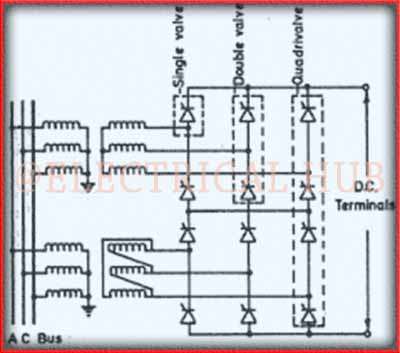HVDC Converter Efficiency: 3 Important Formulas
HVDC Converter Efficiency
HVDC Converter Efficiency is an important factor in determining the overall performance and economic viability of HVDC transmission systems. HVDC converter efficiency refers to how effectively electrical power is converted between alternating current (AC) and direct current (DC) during the transmission process.

Table of Contents
High efficiency is preferred since it reduces power losses and increases the system’s overall cost-effectiveness. The following are the main variables impacting HVDC converter efficiency and the steps to raise it:
Factors Affecting HVDC Converter Efficiency
Converter Type: Efficiency can be considerably impacted by the HVDC converter employed (Line-Commutated Converter, LCC, or Voltage-Sourced Converter, VSC). Due to the sophisticated semiconductor devices (IGBTs) and control strategies used in VSCs, their efficiency is frequently higher.
Operating Voltage and Current: HVDC converter Efficiency depends on the converter’s operating voltage and current levels. Due to lower resistive losses in the transmission lines and components, higher voltage and lower current levels are typically more efficient.
Converter Technology: Efficiency can be impacted by the exact technology and design of the converter, including the semiconductors (such as thyristors or IGBTs) and cooling systems used.
Power Rating: The power rating of the converter can affect efficiency. Due to their ability to benefit from economies of scale in component design, larger converters typically have better efficiencies.
Control System: The sophistication of the control system plays a crucial role in optimizing converter operation. Advanced control algorithms can improve efficiency by minimizing switching losses and maximizing power quality.
Operating Conditions: HVDC Convertor efficiency may be impacted by external factors like temperature. If cooling systems are less efficient, extreme temperatures may diminish efficiency.
DC Link Voltage Ripple: Excessive voltage ripple on the DC side can lead to higher losses and reduced efficiency. Effective filtering and smoothing of the DC voltage can mitigate this.
HVDC Converter Efficiency formulas
Rectification Mode Efficiency (η_rect): The following formula can be used to determine the effectiveness of the rectification mode when AC power is transformed into DC power:
η_rect = (DC Output Power / AC Input Power) × 100%
Where:
- DC Output Power is the power delivered on the DC side of the converter.
- AC Input Power is the power received from the AC grid.
Inversion Mode Efficiency (η_inv): When DC power is transformed back into AC power during the inversion mode, the efficiency can be evaluated as follows:
η_inv = (AC Output Power / DC Input Power) × 100%
Where:
- AC Output Power is the power delivered on the AC side of the converter.
- DC Input Power is the power received on the DC side.
Overall Efficiency (η_overall): The following formula can be used to determine the HVDC converter’s overall efficiency while accounting for both the rectification and inversion modes:
η_overall = (AC Output Power / AC Input Power) × 100%
Where:
- AC Output Power is the power delivered on the AC side of the converter.
- AC Input Power is the power received from the AC grid.
These equations offer a quantitative assessment of the effectiveness of the HVDC converter’s conversion of electrical power between AC and DC forms throughout various operating modes. Efficiency, which is measured as a percentage, is a key aspect in determining the effectiveness and financial viability of HVDC transmission lines.
How to Improve HVDC Converter Efficiency
Use of VSC Technology: Where greater efficiency is sought, take into account employing voltage-sourced converters (VSCs). Comparing VSCs to Line-Commutated Converters (LCCs), advanced control capabilities and lower switching losses are offered.
Higher Voltage, Lower Current: To lessen resistive losses in the transmission lines and components, the HVDC system should be designed to run at higher voltage and lower current levels.
Optimized Control Algorithms: Utilise cutting-edge control algorithms to enhance power quality, minimize switching losses, and optimize converter performance. These algorithms can adjust to shifting load requirements and grid conditions.
Efficient Cooling Systems: Make sure that the cooling systems for converter parts, such as insulated gate bipolar transistors (IGBTs) or thyristors, are created with the greatest amount of efficiency in mind. For this, liquid cooling, air cooling, or a combination of the two may be used.
Regular Maintenance: To keep converter components working at their best, regularly inspect and maintain them. Clean out cooling systems, swap out broken parts, and conduct preventive maintenance as necessary.
Voltage Source Control (VSCs): Use pulse-width modulation (PWM) control techniques in VSC-based converters to produce clear AC waveforms with little switching loss.
DC Link Voltage Control: To cut down on losses brought on by voltage ripple, keep your DC voltage steady and well-regulated.
Loss Minimization during Transients: By enhancing control techniques, pay specific attention to loss minimization under transient conditions including startup, shutdown, and fault recovery.
The cost-effectiveness and environmental sustainability of HVDC transmission lines can be greatly impacted by advances in HVDC converters efficiency. For greater efficiency and to reduce power losses during long-distance energy transmission, it is essential to optimize converter design, control systems, and operating conditions.
Follow us on LinkedIn”Electrical Insights” to get the latest updates in Electrical Engineering. You can also Follow us on LinkedIn and Facebook to see our latest posts on Electrical Engineering Topics.
Worth Read Posts
